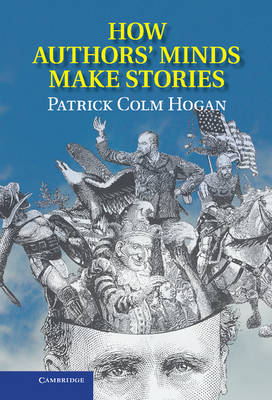
How Authors' Minds Make Stories
Cambridge University Press (Verlag)
978-1-107-03440-2 (ISBN)
This book explores how the creations of great authors result from the same operations as our everyday counterfactual and hypothetical imaginations, which cognitive scientists refer to as 'simulations'. Drawing on detailed literary analyses as well as recent research in neuroscience and related fields, Patrick Colm Hogan develops a rigorous theory of the principles governing simulation that goes beyond any existing framework. He examines the functions and mechanisms of narrative imagination, with particular attention to the role of theory of mind, and relates this analysis to narrative universals. In the course of this theoretical discussion, Hogan explores works by Austen, Faulkner, Shakespeare, Racine, Brecht, Kafka and Calvino. He pays particular attention to the principles and parameters defining an author's narrative idiolect, examining the cognitive and emotional continuities that span an individual author's body of work.
Patrick Colm Hogan is a professor in the Department of English and of the programs in Cognitive Science, Comparative Literature and Comparative Studies, and India Studies at the University of Connecticut. He is the author of fifteen books, including The Mind and its Stories and What Literature Teaches Us about Emotion, and the editor of The Cambridge Encyclopedia of the Language Sciences.
Introduction: from the universal to the particular; 1. Simulation: imagining fictional worlds in Faulkner and Austen; 2. Story development, literary evaluation, and the place of character; 3. A narrative idiolect: Shakespeare's heroic stories; 4. Principles and parameters of storytelling: the trajectory of Racine's romantic tragedies; 5. Argument and metaphor in Brecht and Kafka; 6. Emplotment: selection, organization, and construal in Hamlet; Afterword: if on a winter's night a narrator ….
| Verlagsort | Cambridge |
|---|---|
| Sprache | englisch |
| Maße | 152 x 229 mm |
| Gewicht | 540 g |
| Themenwelt | Geisteswissenschaften ► Philosophie |
| Geisteswissenschaften ► Psychologie ► Allgemeine Psychologie | |
| Geisteswissenschaften ► Psychologie ► Verhaltenstherapie | |
| Geisteswissenschaften ► Sprach- / Literaturwissenschaft ► Anglistik / Amerikanistik | |
| Geisteswissenschaften ► Sprach- / Literaturwissenschaft ► Literaturwissenschaft | |
| Geisteswissenschaften ► Sprach- / Literaturwissenschaft ► Sprachwissenschaft | |
| ISBN-10 | 1-107-03440-X / 110703440X |
| ISBN-13 | 978-1-107-03440-2 / 9781107034402 |
| Zustand | Neuware |
| Informationen gemäß Produktsicherheitsverordnung (GPSR) | |
| Haben Sie eine Frage zum Produkt? |
aus dem Bereich


